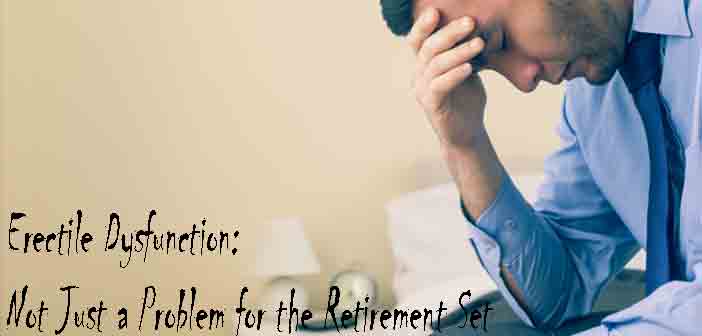If my spam folder is any indication, there’s an international epidemic of erectile dysfunction the likes of which the world has never seen before.
That’s not exactly the case, but there is some cause for concern. Ever since ads for Viagra hit the airwaves more than a decade ago, many of us can quote facts about erectile dysfunction (including what you should do if an erection lasts for more than four hours). Long-term ED affects 5 percent of men by age 40. That figure jumps to 25 percent of men by age 65. Young men are often left out of conversations about erectile dysfunction, but they are suffering from ED at rates higher than previously reported.
A recent study found that a quarter of newly-diagnosed patients were young men (defined as younger than 40) and almost half of these young men suffered from severe erectile dysfunction . When doctors talk about severe ED, they’re referring to men who find themselves unable to get or maintain an erection during sex.
3 Things That Fuel Flaccidity
There are three main culprits when it comes to erectile dysfunction: physical problems, psychological problems, and problems caused by medication.
Your doctor should advise you if any medication you’re taking could cause you to remain flaccid, even while aroused. So if it’s not medication, your symptoms are likely physical or psychological. Here’s a quick test: If you can get an erection when masturbating or still wake up at full salute, then your troubles are probably psychological. The underlying problem may stem from stress, fatigue, or relationship issues. And then, there’s always the potential that you threw back one too many boozy beverages.
A Package Deal
Poor penis function can indicate all kinds of other health problems, including hormonal and vascular disorders.
Hormone disorders, such as hypogandism, can cause the body to produce incredibly low levels of testosterone, which can decrease erectile function. But it’s not just sufferers of bonafide disorders who should be worried about testosterone levels. There’s a strange endemic in modern society: The testosterone levels in young men are decreasing .
Testosterone governs men’s libidos, from the number of times they want to have sex to the frequency with which they get an erection. Suffice to say, this hormone is a pretty big deal. And testosterone isn’t just about feeling more like a man—it affects bodily functions, from muscle growth to cardiovascular health.
Erectile dysfunction might also be a warning sign for larger vascular problems. A fully functional heart and a fully functional penis are a package deal. The penis is populated with a collection of arteries. Under normal conditions, when it’s time to perform, a man’s brain alerts the nerves in the penis, the arteries expand, more blood is supplied to the erectile tissue, and the penis becomes engorged with blood.
So ED could indicate larger issues with blood flow throughout the body. Poor blood flow can be attributed to a number of vascular issues, including coronary artery disease, where plaque builds up and can eventually block arteries. This can lead to chest pain and even a full-blown heart attack .
The Lifestyle Rx to Prevent ED
Don’t fall for the “erectile enhancement” ads that end up in your spam folder, and be wary of ads for prescription pills to treat ED. Nearly one-fifth of the more than 18 million men affected by erectile dysfunction opt to take prescription drugs, such as Viagra and Cialis. But popping pills isn’t the right option for everyone with ED. You can boost testosterone levels while also improving cardiovascular health with the exact same lifestyle change. The basic prescription? Exercise (with weights!) and watch what you eat.
Recent research has shown that men who are physically active have better erectile function . Weight training can also increase testosterone levels and improve cardiovascular health, two key components to thwarting erectile dysfunction .
The effects of simple diet and exercise on patients with ED are remarkable. In one study, obese men with ED were put on a calorie-restricted diet for two years and were advised to be more physically active. Not only did these men lose a lot of weight, the severity of their ED also decreased . Another study found that exercise helps with erectile function, even if you don’t adhere to a healthy diet . The only caveat: If you eat lots of junk food, you’ll need a higher level of physical activity to ensure erectile function and cardio protection.
Don’t Be Afraid to Talk About Your Penis
Listen, guys: If there’s one thing you should take away from this article, it’s that erectile dysfunction isn’t just an issue for the retirement set. It’s an issue that can affect 20-something men too. If you suspect you might be suffering from ED, talk to your doctor about the issue. More than likely, your doctor will prescribe lifestyle changes, including a healthier diet and more exercise. But you’ll also be making sure your penis problem isn’t indicating more serious health issues.

